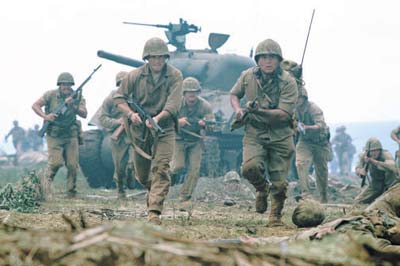Delegate Larry Anderson of Fort Defiance, sponsor of the legislation, told council, "In all the war histories of the United States, no other language other than English was used, except in World War II, when the United States for the first time in its military history used the Navajo people, and used Navajo words to win the war."


5 comments:
I know there were other codetalkers. See
http://www.turtletrack.org/Issues00/Co06032000/CO_06032000_Codetalk.htm
for a typical posting on the Choctaw and Comanche codetalkers.
If the non-Navajo codetalkers ever come up in a pop-cultural context, such as getting their own holiday, I'll mention them.
Several years ago at a powwow in northern Idaho I had the honor of meeting the last 2 remaining Navajo code talkers. I had my picture taken with them and I was positively gushing with enthusiasm at meeting them. I'm sure I embarrassed myself and they couldn't have been more polite and kind to me. It truly was an honor.
The media tends to promote stereotypes about Natives, not accurate representations. A codetalker doesn't fit the standard storyline of Indians as savages, drunks, or lazy bums. If Oklahoma's governor had denounced greedy casino Indians, I bet the national media would've covered it.
ca·si·no –noun, plural -nos
1. a building or large room used for meetings, entertainment, dancing, etc., esp. such a place equipped with gambling devices, gambling tables, etc.
One, a bingo hall is arguably a form of casino. Two, if there weren't any casino Indians in Oklahoma in 1989 and the governor denounced them anyway, it would've been more likely to gain national attention, not less. Three, my comment was another analogy, not something to take literally.
You can learn more about Indian gaming and its history in The Facts About Indian Gaming.
I don't know what you're referring to with this quote, Russ:
"Let's see what Rob has said -- mascots and stereotypes and biases are not analogies and thus instead are to be taken literally."
The only thing I said about stereotypes in this thread is:
"The media tends to promote stereotypes about Natives, not accurate representations."
That is, I contrasted stereotypes with accurate representations, saying they were different. This is the opposite of saying stereotypes "are not analogies and thus instead are to be taken literally."
If you're referring to this statement of mine:
"Three, my comment was another analogy, not something to take literally."
that was a reference to
"If Oklahoma's governor had denounced greedy casino Indians, I bet the national media would've covered it."
That sentence was indeed an analogy of sorts and not a literal statement. More to the point, it was a specific hypothetical about the governor's actions, not a general claim about stereotypes or biases. It had nothing to do with our previous disagreements.
In short, your last posting is based on an erroneous reading of my previous posting. If at first you don't succeed, try, try again.
Post a Comment